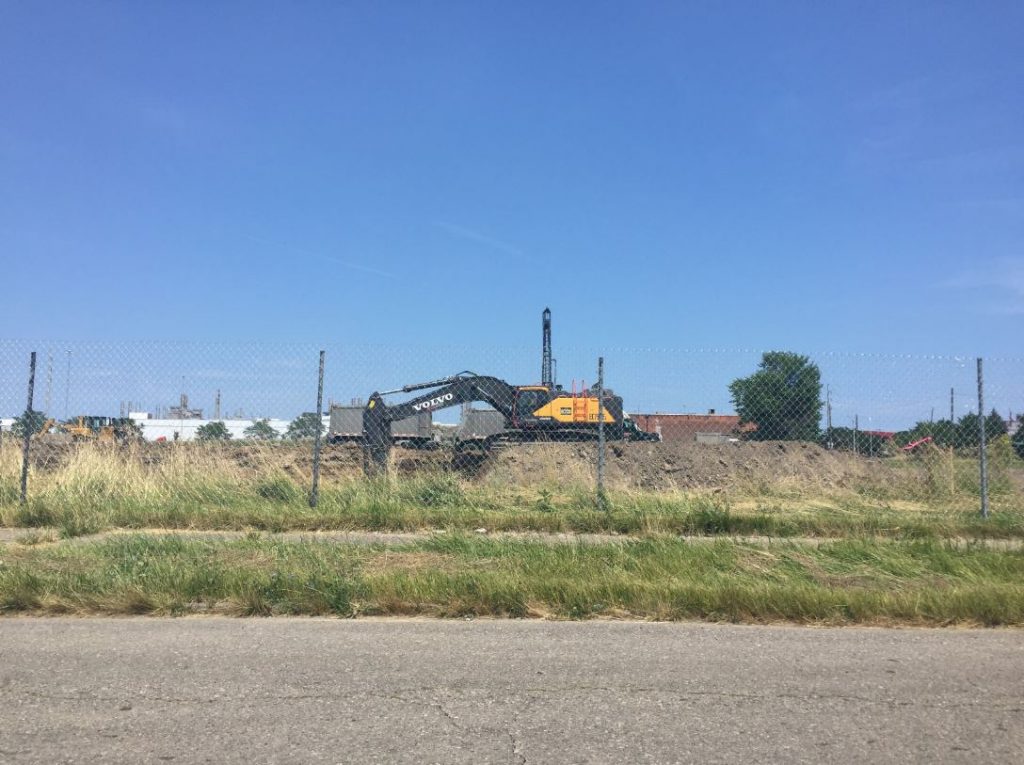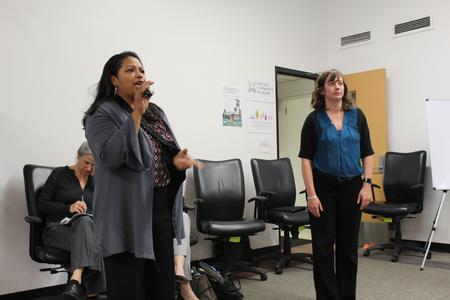What Detroit’s Eastsiders Want to See From Fiat Chrysler To Improve Air Quality [UPDATED]
A state agency is requiring the automaker to present a plan to improve air quality. Residents weigh-in on improvements they would like to see.

This article was updated 10/7/2019
Fiat Chrysler Automobiles is building a new assembly plant on Detroit’s eastside and, as a result, it has to present a plan to improve air quality for Detroit eastsiders. An air quality permit issued to FCA for the plant from the Michigan Department of Environment, Great Lakes and Energy (EGLE) in April says the automaker needs to identify projects to implement as a benefit to the community surrounding the facility. This needs to happen no later than 180 days after FCA began construction, which makes the deadline Nov. 30, 2019, according to EGLE.
This community benefit stipulation was added to the air quality permit issued by EGLE, in response to community concerns about noxious paint fumes that will be emitted from the eastside plant.
Click on the player above to hear where Fiat Chrysler is at in satisfying its permit requirement of presenting new community benefits related to air quality.

EGLE Permit Section Manager Annette Switzer says the regulator does not want FCA to merely present projects it has already agreed to as part of the community benefits process it underwent in the spring, as required by a Detroit ordinance. As a result of the air quality permit stipulation, Switzer says, EGLE is expecting FCA to present new projects informed by the new community outreach.
“What we’re looking for in particular from the community benefits plan is an explanation to us of who they met with, who they spoke with, what community groups they provided outreach to and actually tried to speak with to get information,” says Switzer.
Many eastside stakeholders say they aren’t waiting for the company to contact them. In early October they released a petition of six asks ranging from community meetings to putting millions of dollars into a public health fund.
“Even when you’re happy that someone has chosen to invest, you can make reasonable demands that they do the right thing and they protect the health of, not only of the people living around here, but the health of their employees,” says Donna Givens, president and CEO of the Eastside Community Network, one of the groups involved in putting the petition together.
Read the full petition here. Scroll down for more details.
Support the news you love.
Here at WDET, we strive to make our journalism accessible to everyone. As a non-profit public media institution, we maintain our journalistic integrity through independent support from readers like you. Because you value WDET as your source of news, music, and conversation, please make a gift of support today. Even $5 helps!
Activists are asking for:
A Vegetative Buffer
FCA has already started building a wall between one residential street and the plant. The wall, which was requested as part of the city’s community benefit process, is supposed to be covered in ivy. Activists would like to see a vegetative buffer surrounding the entire plant. The idea is that roots from a plant barrier would help in areas that are prone to flooding. In order to help drain water and improve air quality, activists would like to see trees planted on lots owned by the Detroit Land Bank Authority, as well as given to residents to plant in their yards.
Air Filters
Activists would like to see air filters purchased for head start facilities, schools, and senior residences since, as the petition says, “air filters can reduce exposure to pollutants for vulnerable populations.”
Air Monitoring
Activists want to see ongoing off-site and mobile monitoring of air quality.
Truck Routing
Since the plant expansion will cause more traffic from FCA and parts suppliers, activists want to see the community regularly consulted about traffic in the area and options for re-routing it.
Regular Community Meetings
Activists would like to see regular community meetings with updates on air monitoring and a chance for feedback.
Public Health Fund
Activists want to see at least $12.5 million put into a Health Fund. The city already has such a fund. It was created as part of a 2017 ordinance that regulates petcoke, a petroleum byproduct produced by a refinery in Southwest Detroit.
The community benefits that will be presented to EGLE before Nov. 30 should not be confused with the benefits that were agreed upon as part of the city’s own community benefits process, required by a Detroit ordinance. The benefits that came out of that process last spring can be viewed in this presentation.
